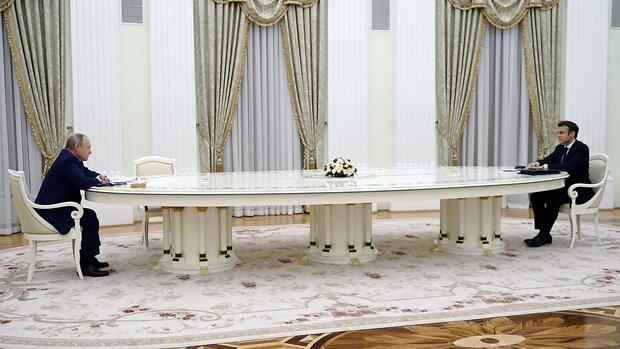The presidents of Russia and France spoke for more than five hours about the crisis.
(Photo: dpa)
Paris The seating arrangement at the meeting between Emmanuel Macron and Vladimir Putin in Moscow made it clear how far apart the West and Russia are in the Ukraine crisis. The Protocol Department at the Kremlin had placed the chairs of the Presidents of France and Russia at the far ends of a long, oval table.
The conversation took place in a small group, according to information from Élysée circles, there was only one interpreter in the room next to the two presidents. But at least there is talk – that is the message that Macron delivered at the subsequent press conference on Monday evening. “We cannot take the common risk of seeing the return of the specter of instability and confrontation,” he said.
Macron and Putin sat together for more than five hours, and the press conference started about three hours late. There were no concrete results. However, Putin let it be known that “some of the ideas, the proposals of Emmanuel Macron could be a basis for joint progress”.
The Russian President did not give any details, and Macron also kept a low profile. Among other things, the French President came to Moscow with the offer of a new “security and stability order” in Europe, which he had already proposed in his speech to the European Parliament in Strasbourg in mid-January. It is about “concrete security guarantees” for both sides, such as a limit on the transfer of military units to the border.
Top jobs of the day
Find the best jobs now and
be notified by email.
But Macron also drew red lines: the territorial integrity of states should not be questioned, nor should the principle of non-interference in internal affairs. It is important that the “misunderstandings and traumas” that have built up between Russia and its European neighbors over the past three decades are reduced.
Putin, on the other hand, reiterated his position that the aggression came from NATO and the eastward expansion of the military alliance. He cited the military operations in Afghanistan and Libya as examples of the alleged threat. The Russian President complained that the current tensions were being used in the West for an “anti-Russian policy”.
Macron: “I don’t believe in spontaneous miracles”
Russia has massed an estimated 100,000 soldiers and armored units on the border with Ukraine. The USA, NATO and the EU fear an invasion of the neighboring country. Russian troops had already occupied Crimea in spring 2014, and Russia then annexed the peninsula after a controversial referendum. Moscow also supports the separatists who have seized control of the Donbass region in eastern Ukraine.
Even before the meeting with Macron, the Kremlin had dampened hopes: A breakthrough was not to be expected. Macron also had very low expectations before his departure: “I don’t believe in spontaneous miracles,” said the Frenchman. After the meeting, in addition to the major differences, he spoke at the press conference of “some points of rapprochement”.
Macron was the first Western head of state to travel to Moscow after the renewed escalation of the Ukraine crisis in recent weeks. In the Élysée Palace, it is assured that the President has coordinated closely with Germany and Scholz for the trip. The Chancellor discussed the Ukraine crisis with US President Joe Biden in Washington on Monday, and the SPD politician wants to meet Putin in the Russian capital on February 15.
>> Read here: During Olaf Scholz’s visit, the US President emphasized Germany’s reliability. The fact that the Chancellor did not explicitly reject Nord Stream 2 in the event of an invasion of Russia caused criticism.
While the German government was initially criticized internationally for its cautious course in the Ukraine conflict, Macron had undertaken avid telephone diplomacy: he called Putin three times before his trip to Moscow. Macron also exchanged views several times with the Ukrainian head of state Volodymyr Zelenskyy. There were also phone calls with Scholz, Biden, British Prime Minister Boris Johnson, Canada’s Prime Minister Justin Trudeau, EU Commission President Ursula von der Leyen and the heads of government of several Eastern European countries.
Macron sees Ukraine as a test case for “European sovereignty”
Macron is also so committed because he sees the Ukraine crisis as further evidence that Europeans must take their fate into their own hands. The French EU Council Presidency in the first half of 2022 is dominated by the goal of “European sovereignty”, which Macron has been promoting for years. It was horrifying for him when the Europeans initially played a supporting role in the negotiations while Russia and the US wrestled over war and peace on the EU’s external borders.
The French election campaign is also hovering over Macron’s diplomatic activities. Although the President has not yet officially announced his candidacy, there is no doubt that he will stand for re-election in April. Last week, he further delayed the announcement, citing the “current geopolitical crisis”: He had promised the French “that he would be president until the end, and we have a crisis on the Ukrainian border that threatens our collective security,” Macron said in an interview.
The advantage for him: he can continue to be the statesman without the restraint in office that would be expected of him as an official candidate in the election campaign. Macron will continue his diplomatic mission in Kiev on Tuesday morning, where he will meet with President Zelenskyy.
He will then meet with Scholz and Polish President Andrzej Duda to agree on how the EU should proceed in the conflict. “The next few days will be crucial,” said Macron.
More: With her “no” to arms deliveries, Baerbock met with a lack of understanding in Ukraine
